
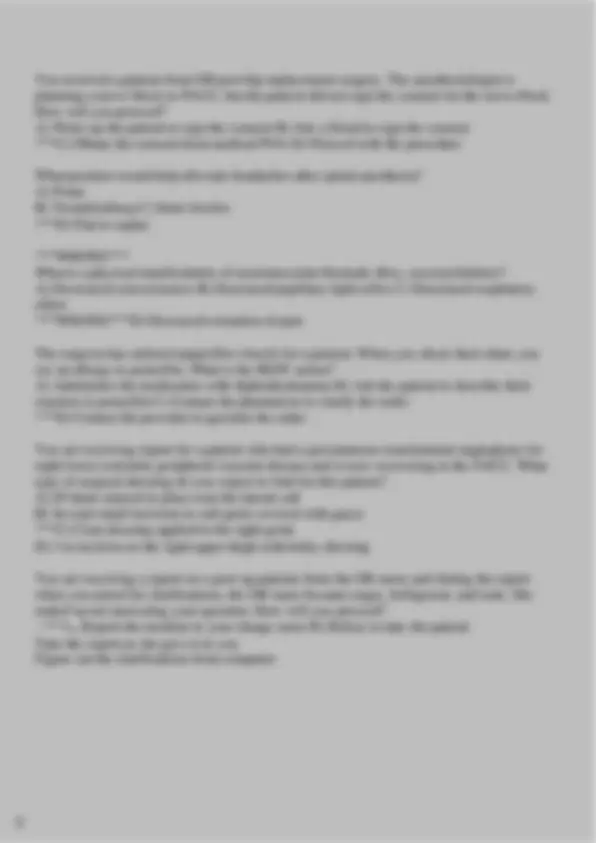
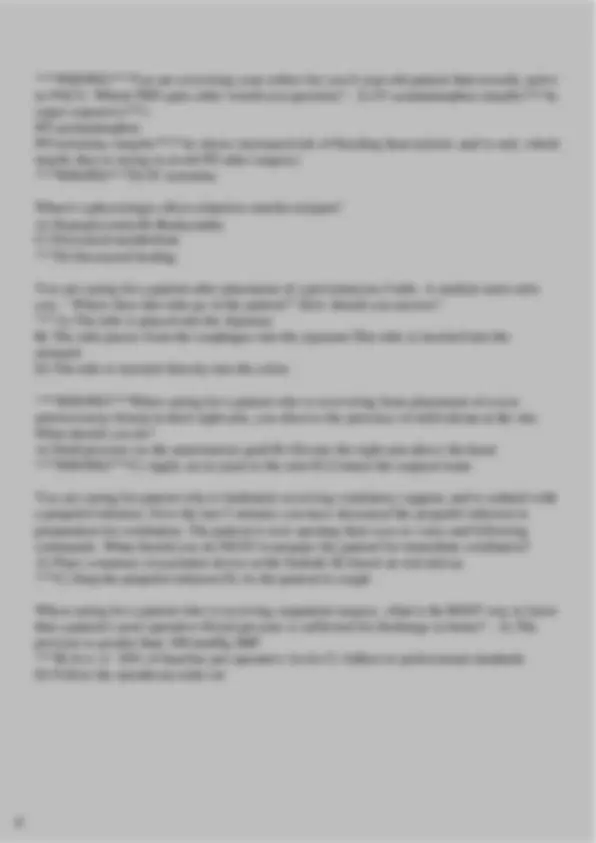
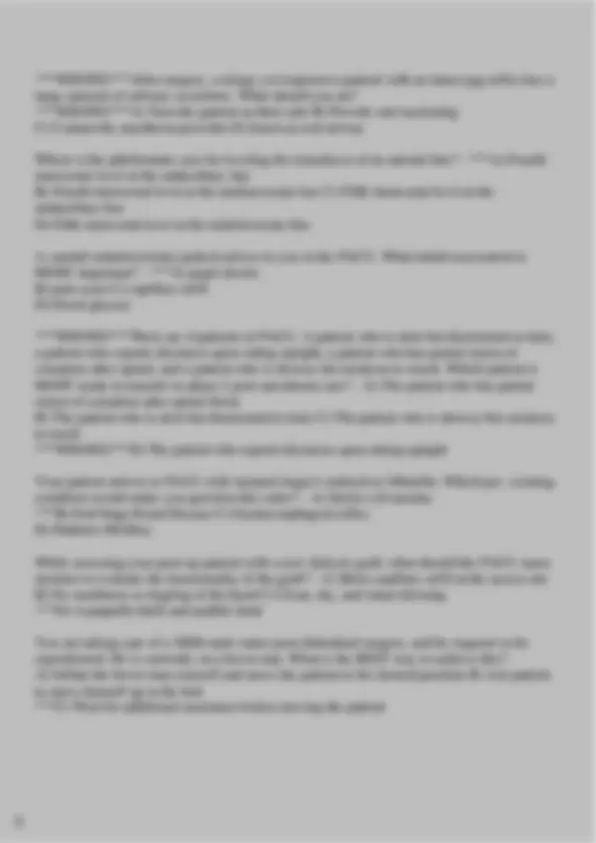
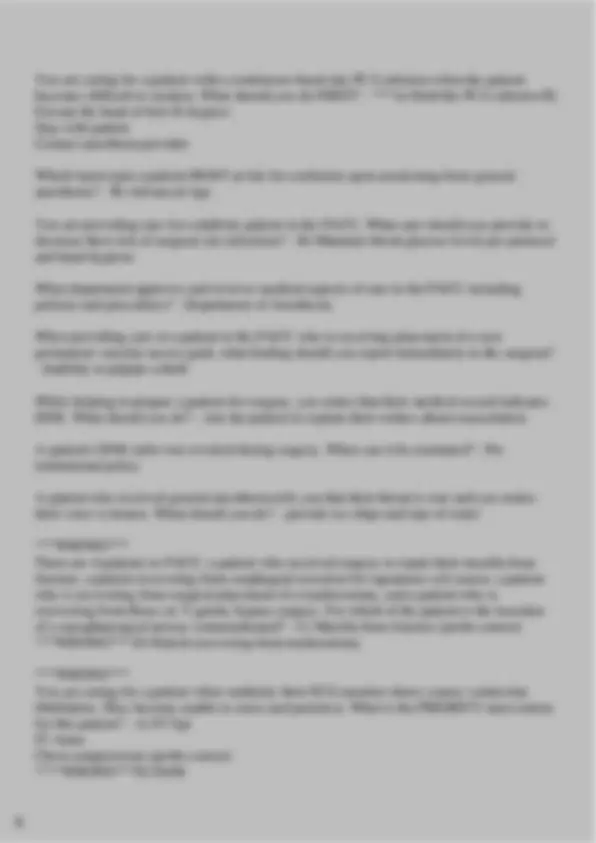
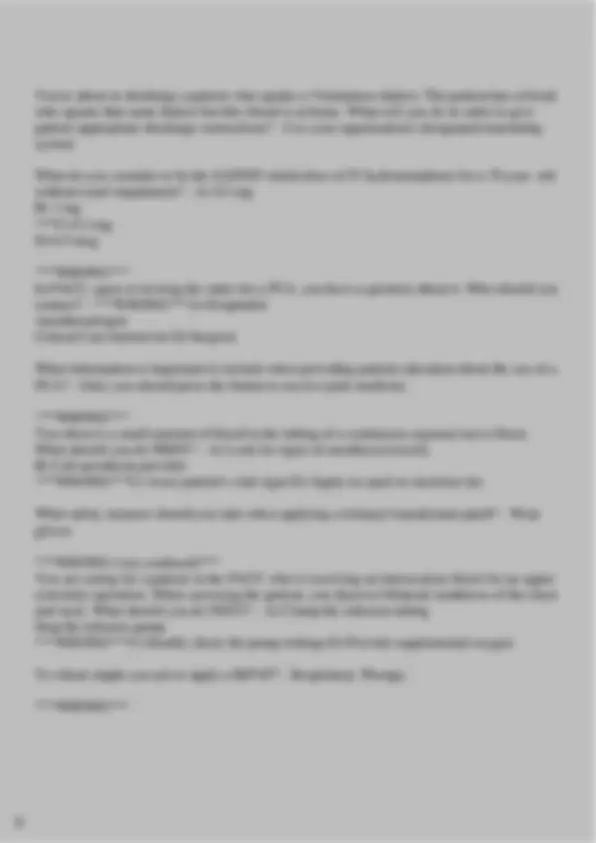
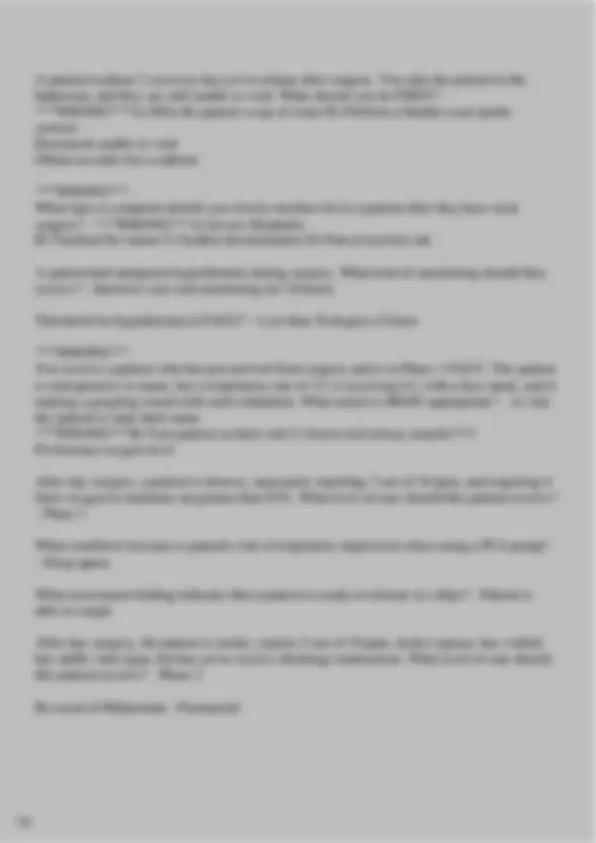


Study with the several resources on Docsity

Earn points by helping other students or get them with a premium plan


Prepare for your exams
Study with the several resources on Docsity

Earn points to download
Earn points by helping other students or get them with a premium plan
Community
Ask the community for help and clear up your study doubts
Discover the best universities in your country according to Docsity users
Free resources
Download our free guides on studying techniques, anxiety management strategies, and thesis advice from Docsity tutors
Prophecy General ICU RN A V1 2025 EXAM- Questions & Answers With Complete Top Solutions | Rated A+
Typology: Exams
1 / 11

This page cannot be seen from the preview
Don't miss anything!







Meperidine (Demerol) 12.5mg every 15 minutes, IV prn is ordered for shivering in the PACU. Meperidine is available in 50mg/1ml. How many mililiters should be given? 0.25 mililiters Upon inspecting a patient's epidural insertion site, you notice swelling around the catheter. What should you do? A) Position the patient on their side B) Place the patient in a prone position C) Check the epidural line for kinks ***D) Contact the anesthesia provider What set of findings indicates a patient is likely to be ready for phase 1 discharge? A) Has received discharge instructions, pain level 9 out 10, shortness of breath Drowsy, blood pressure returned to preoperative levels, on 6 liters oxygen via face mask ***C) Drowsy, oxygen saturation of 96%, able to cough, and move all extremities D) Fully alert, shallow breathing, on 3 liters via T-piece, can move 2 extremities What do you consider to be a safe dose of intravenous fentanyl for an adult who does not have tolerance to opioids?
WRONGYou are reviewing your orders for you 8 year-old patient that recently arrive in PACU. Which PRN pain order would you question? - A) IV acetaminophen (maybe??? bc super expensive???) PO acetaminophen PO ketorolac (maybe???? bc shows increased risk of bleeding than tylenol, and is oral, which maybe they're trying to avoid PO after surgery) WRONGD) IV ketorolac What is a physiologic effect related to unrelieved pain? A) Hypoglycemia B) Bradycardia C) Decreased metabolism ***D) Decreased healing You are caring for a patient after placement of a percutaneous J tube. A student nurse asks you, " Where does this tube go in the patient?" How should you answer? ***A) The tube is placed into the Jejunum B) The tube passes from the esophagus into the jejunum This tube is inserted into the stomach D) The tube is inserted directly into the colon WRONGWhen caring for a patient who is recovering from placement of a new arteriovenous fistula in their right arm, you observe the presence of mild edema at the site. What should you do? A) Hold pressure on the anastomosis graft B) Elevate the right arm above the heart WRONGC) Apply an ice pack to the arm D) Contact the surgical team You are caring for patient who is intubated, receiving ventilatory support, and is sedated with a propofol infusion. Over the last 5 minutes you have decreased the propofol infusion in preparation for extubation. The patient is now opening their eyes to voice and following commands. What should you do NEXT to prepare the patient for immediate extubation? A) Place a manual, resuscitator device at the bedside B) Insert an oral airway ***C) Stop the propofol infusion D) As the patient to cough When caring for a patient who is receiving outpatient surgery, what is the BEST way to know that a patient's post-operative blood pressure is sufficient for discharge to home? - A) The pressure is greater than 100 mmHg SBP ***B) It is +/- 20% of baseline pre-operative levels C) Adhere to professional standards D) Follow the anesthesia order set
WRONGAfter surgery, a sleepy yet responsive patient with an intact gag reflex has a large amount of salivary secretions. What should you do? WRONGA) Turn the patient on their side B) Provide oral suctioning C) Contact the anesthesia provider D) Insert an oral airway Where is the phlebostatic axis for leveling the transducer of an arterial line? - ***A) Fourth intercostal level at the midaxillary line B) Fourth intercostal level at the midclavicular line C) Fifth intercostal level at the midaxillary line D) Fifth intercostal level at the midclavicular line A carotid endarterectomy patient arrives to you in the PACU. What initial assessment is MOST important? - ***A) pupil checks B) pain scale C) capillary refill D) blood glucose WRONGThere are 4 patients in PACU: A patient who is alert but disoriented to time, a patient who reports dizziness upon sitting upright, a patient who has partial return of sensation after spinal, and a patient who is drowsy but awakens to touch. Which patient is MOST ready to transfer to phase 2 post-anesthesia care? - A) The patient who has partial return of sensation after spinal block B) The patient who is alert but disoriented to time C) The patient who is drowsy but awakens to touch WRONGD) The patient who reports dizziness upon sitting upright Your patient arrives to PACU with lactated ringer's ordered at 100ml/hr. Which pre- existing condition would make you question this order? - A) Sickle cell anemia ***B) End Stage Renal Disease C) Gastroesophageal reflux D) Diabetes Mellitus While assessing your post-op patient with a new dialysis graft, what should the PACU nurse monitor to evaluate the functionality of the graft? - A) Brisk capillary refill at the access site B) No numbness or tingling of the hand C) Clean, dry, and intact dressing ***D) A palpable thrill and audible bruit You are taking care of a 300lb male status post abdominal surgery, and he requests to be repositioned. He is currently on a hover mat. What is the BEST way to achieve this? A) Inflate the hover mat yourself and move the patient to his desired position B) Ask patient to move himself up in the bed ***C) Wait for additional assistance before moving the patient
Tingling in hands and feet WRONG* After a 6 - hour abdominal surgery during which a patient was on their back, a patient reports persistent lower back pain. What should you do next? - WRONGA) Help them to a new position Administer pain medication Inspect their lower back (probs correct, pt might be bleeding into back) D) Check their hematocrit What is a result of shivering? - A) Decreased oxygen consumption ***B) Increased oxygen demand C) Peripheral vasoconstriction D) Elevated end tidal CO WRONG What combination of medications is an example of multi-modal pain management? - A) IV PCA morphine with IV fentanyl WRONGB) Oral morphine ER and IV morphine C) IV hydromorphone and IV acetaminophen (probs correct, one is opioid, other is not) D) IV hydromorphone and IV morphine You are caring for a patient with a brachial plexus block after surgery. The patient begins to report chest discomfort on the side where the block was placed. A 12 lead EKG was normal. What order do you expect to be completed NEXT for this patient? - A) Echo B) Cardiac biomarkers C) CMP ***D) Chest X-ray You need to obtain consent from a sedated patient post hip replacement surgery for a regional block. Two women showed up at bedside as next of kin. One has a child with patient and the other is the patient's girlfriend. How will you obtain the consent? - A) Proceed with patient signature ***B) Look for patient's parents or immediate family members C) Allow one of the women to sign D) Allow both women to sign WRONG What instructions for care should you include when educating a patient about their Penrose drain? - WORNGA) You will have bright red drainage from the tube for several days B) Change your dressing 2 times a day or when it becomes wet (very probs correct) C) This drainage tube helps prevent accumulation of bile D) Remove the safety pin at the end of the tube when you get home
You are caring for a patient with a continuous basal rate PCA infusion when the patient becomes difficult to awaken. What should you do FIRST? - ***A) Hold the PCA infusion B) Elevate the head of bed 45 degrees Stay with patient Contact anesthesia provider Which factor puts a patient MOST at risk for confusion upon awakening from general anesthesia? - B) Advanced Age You are providing care for a diabetic patient in the PACU. What care should you provide to decrease their risk of surgical site infections? - B) Maintain blood glucose levels per protocol and hand hygiene What department approves and reviews medical aspects of care in the PACU including policies and procedures? - Department of Anesthesia When providing care to a patient in the PACU who is receiving placement of a new permanent vascular access graft, what finding should you report immediately to the surgeon?
A patient in phase 2 recovery has yet to urinate after surgery. You take the patient to the bathroom, and they are still unable to void. What should you do FIRST? - WRONGA) Offer the patient a cup of water B) Perform a bladder scan (probs correct) Document unable to void Obtain an order for a catheter WRONG What sign or symptom should you closely monitor for in a patient after they have neck surgery? - WRONGA) Severe Headache B) Tracheal Deviation C) Sudden disorientation D) Pain at incision site A patient had malignant hyperthermia during surgery. What kind of monitoring should they receive? - Intensive care unit monitoring for 24 hours Threshold for hypothermia in PACU? - Less than 36 degrees Celsius WRONG You receive a patient who has just arrived from surgery and is in Phase 1 PACU. The patient is unresponsive to name, has a respiratory rate of 12, is receiving 6 L with a face mask, and is making a gurgling sound with each exhalation. What action is MOST appropriate? - A) Ask the patient to state their name WRONGB) Turn patient on their side C) Insert oral airway (maybe???) D) Increase oxygen level After day surgery, a patient is drowsy, nauseated, reporting 7 out of 10 pain, and requiring 4 liters oxygen to maintain sat greater than 92%. What level of care should this patient receive?
A sedated patient has just arrived to the PACU from the operating room with the anesthesia provider and a member of the surgical team. What should you do next? - Assess their airway and oxygenation WRONG (no idea what correct answer is) What drug is MOST effective in upper airway emergencies? - A) Terbutaline B) Nebulized albuterol WRONGC) Humidified oxygen D) Racemic epinephrine WRONG You are caring for a patient in the PACU who was intubated and received general anesthesia during surgery. Now extubated, the patient reports feeling pain in their front tooth. Upon inspection, the tooth appears loose. What should you do? - A) Contact the anesthesia provider and ask them to inspect the oral cavity (probs correct) WRONGB) Review the preoperative documentation about the patient's dentition C) Secure the tooth by packing folded or rolled gauze around it D) Contact the surgical team and ask them to inspect the patient's throat What would delay discharge home when caring for a patient who received spinal anesthesia?